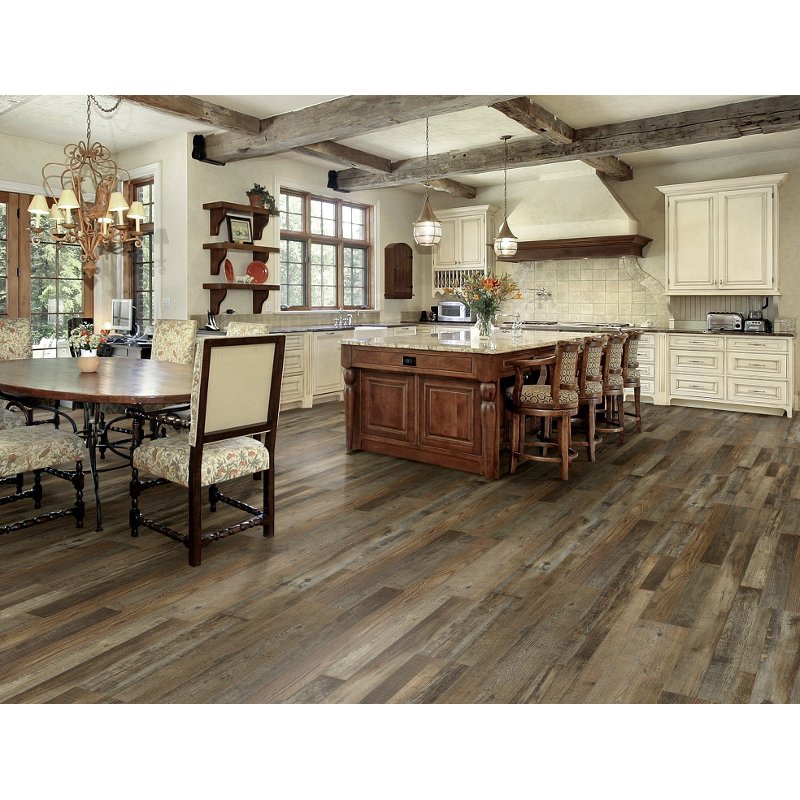Trading Real Wood for Fake Wood: Pros and Cons
Whether you are building a new home, renovating an old one, or just deciding it is time for a change, switching up your flooring is a major step as a homeowner. The factors you have to consider when picking what to replace your current floors with are endless. From price to style to flooring type, there are many options available on the market, and knowing which one is the right one for you can be grueling.

Replacing wood is especially difficult because of the ever-growing engineered hardwood, laminate and luxury vinyl tile (LVT) options. There are so many different designs, textures, prices and qualities to choose that the process can be confusing and overwhelming.
Even here at Georgia Carpet Industries we have a lot of options, and knowing which one is the best can be challenging. We understand this and have compiled a pros and cons list to help narrow down your decision. If you are looking to replace solid hardwood flooring with a faux wood floor, there are some things to consider.
Pros of Switching to Faux Wood Flooring (Laminate, Engineered, and LVT/LVP):
Durability/Maintenance
When purchasing flooring, one of the first aspects you look into is how it will hold up according to your needs. A major pro of faux wood floors is their scratch resistance and easy maintenance. Solid hardwood tends to easily scratch and show wear since it is made from natural materials. Excessive moisture will cause it to cup, leaving you with costly replacements. Hardwood is generally a higher maintenance flooring, as it requires resanding and repolishing every several years to maintain its quality.
Engineered hardwood is a suitable in-between for faux and real wood. It has the timeless look of wood with the worry-free maintenance and scratch-resistance of faux wood. Laminate floors are constructed of pressed wood, making them more durable against wear and tear. They are also water-resistant, so cleaning up pet messes or spills is simple, and you won't have to worry about permanent damage to your floors. LVT/LVP, on the other hand, is the winner when it comes to waterproofing. Its synthetic makeup is perfect for cleaning and spills since it doesn't absorb a lot of moisture.
Pricing/Cost
Another major factor in picking out flooring is cost. Solid hardwood is generally pricier since it is made from harvested trees. There are more resources put into crafting these planks and, depending on the wood type you want, real hardwood floors can get expensive. This is especially true if you are planning to change the floors throughout your house with the same wood.
Faux wood is definitely the winner when it comes to pricing. You get the same look of solid hardwood without the massive price tag. There is a little variance in cost, depending on what style/wood type you want but, overall, faux wood won't break your bank.
Installation
Based on where you want to place your flooring, faux wood has a major advantage over hardwood. Solid wood cannot be installed in basements/below grade level due to moisture. The installation method you choose can also have an impact on price, adding more to the cost.
The various faux wood options offer easier installation on any level. A majority of engineered hardwood, LVT/LVP and laminate flooring can be installed over radiant heat systems, while solid hardwood does not have this ability. Overall, faux wood is more versatile when it comes to installation and grade levels.
Cons of Switching to Faux Wood Flooring:
Difficult Repairs
With solid hardwood, refinishing a furniture drag scratch is easy. A sander and some polish will have the flooring looking like new. The wood can be patched back together and still hold the same quality.
Faux wood is not quite as simple. You can't just buff out marks and dents; there are more factors that go into making repairs. These floors require specific repair kits that can become costly over time. In some cases, replacing a whole plank may be needed. This poses another challenge when finding/buying a replacement, matching it and having it installed or cut to fit.
Artificial Look
While there are many good imitations of hardwood, every single one pales in comparison to the look of 100% solid flooring. Faux wood floors attempt to recreate what nature formed and though they are beautiful in their own ways, they lack the rich character of wood. Synthetic/man-made products will always strive to look like nature-made ones, but the simple graining and knots found in real wood cannot be mimicked through craftsmanship.
Lacks the Same Quality/Timelessness
Solid hardwood came before the many synthetic options we have now. Its long-lasting quality and traditional look have remained the standard for years. Faux hardwood has its perks but does not have the same value (price and quality-wise) as real hardwood. If you are looking to make a long-term investment, solid hardwood is where it is. Having such high-quality flooring, adds value to a home if you are trying to resell or rent.
Making the decision to change the flooring in your home shouldn't be taken lightly, as there are a lot of things to consider. However, at the same time, it shouldn't be overly stressful either. By gathering as much information as possible and thinking about your personal preferences, style and décor, you should be able to find the flooring that will make your house look astounding, whether it's real wood or faux wood.
After weighing a few of these pros and cons, are you ready to trade your real wood for faux? Or maybe you want to keep your solid hardwood? Whatever your choice may be, we have tons of options available here at Georgia Carpet Industries. You can visit us online at georgiacarpet.com or in-store. Request a quote today!


